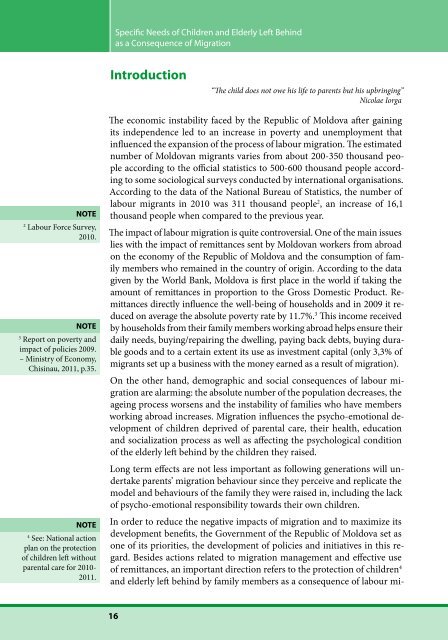specific needs of children and elderly left behind as a ... - IOM Moldova
specific needs of children and elderly left behind as a ... - IOM Moldova
specific needs of children and elderly left behind as a ... - IOM Moldova
You also want an ePaper? Increase the reach of your titles
YUMPU automatically turns print PDFs into web optimized ePapers that Google loves.
Specific Needs <strong>of</strong> Children <strong>and</strong> Elderly Left Behind<br />
<strong>as</strong> a Consequence <strong>of</strong> Migration<br />
Introduction<br />
“The child does not owe hi s life to pare nt s but hi s upbr ing ing”<br />
Nicolae Iorga<br />
NOTE<br />
2<br />
Labour Force Survey,<br />
2010.<br />
NOTE<br />
3<br />
Report on poverty <strong>and</strong><br />
impact <strong>of</strong> policies 2009.<br />
– Ministry <strong>of</strong> Economy,<br />
Chisinau, 2011, p.35.<br />
NOTE<br />
4<br />
See: National action<br />
plan on the protection<br />
<strong>of</strong> <strong>children</strong> <strong>left</strong> without<br />
parental care for 2010-<br />
2011.<br />
The economic instability faced by the Republic <strong>of</strong> <strong>Moldova</strong> after gaining<br />
its independence led to an incre<strong>as</strong>e in poverty <strong>and</strong> unemployment that<br />
influenced the expansion <strong>of</strong> the process <strong>of</strong> labour migration. The estimated<br />
number <strong>of</strong> <strong>Moldova</strong>n migrants varies from about 200-350 thous<strong>and</strong> people<br />
according to the <strong>of</strong>ficial statistics to 500-600 thous<strong>and</strong> people according<br />
to some sociological surveys conducted by international organisations.<br />
According to the data <strong>of</strong> the National Bureau <strong>of</strong> Statistics, the number <strong>of</strong><br />
labour migrants in 2010 w<strong>as</strong> 311 thous<strong>and</strong> people 2 , an incre<strong>as</strong>e <strong>of</strong> 16,1<br />
thous<strong>and</strong> people when compared to the previous year.<br />
The impact <strong>of</strong> labour migration is quite controversial. One <strong>of</strong> the main issues<br />
lies with the impact <strong>of</strong> remittances sent by <strong>Moldova</strong>n workers from abroad<br />
on the economy <strong>of</strong> the Republic <strong>of</strong> <strong>Moldova</strong> <strong>and</strong> the consumption <strong>of</strong> family<br />
members who remained in the country <strong>of</strong> origin. According to the data<br />
given by the World Bank, <strong>Moldova</strong> is first place in the world if taking the<br />
amount <strong>of</strong> remittances in proportion to the Gross Domestic Product. Remittances<br />
directly influence the well-being <strong>of</strong> households <strong>and</strong> in 2009 it reduced<br />
on average the absolute poverty rate by 11.7%. 3 This income received<br />
by households from their family members working abroad helps ensure their<br />
daily <strong>needs</strong>, buying/repairing the dwelling, paying back debts, buying durable<br />
goods <strong>and</strong> to a certain extent its use <strong>as</strong> investment capital (only 3,3% <strong>of</strong><br />
migrants set up a business with the money earned <strong>as</strong> a result <strong>of</strong> migration).<br />
On the other h<strong>and</strong>, demographic <strong>and</strong> social consequences <strong>of</strong> labour migration<br />
are alarming: the absolute number <strong>of</strong> the population decre<strong>as</strong>es, the<br />
ageing process worsens <strong>and</strong> the instability <strong>of</strong> families who have members<br />
working abroad incre<strong>as</strong>es. Migration influences the psycho-emotional development<br />
<strong>of</strong> <strong>children</strong> deprived <strong>of</strong> parental care, their health, education<br />
<strong>and</strong> socialization process <strong>as</strong> well <strong>as</strong> affecting the psychological condition<br />
<strong>of</strong> the <strong>elderly</strong> <strong>left</strong> <strong>behind</strong> by the <strong>children</strong> they raised.<br />
Long term effects are not less important <strong>as</strong> following generations will undertake<br />
parents’ migration behaviour since they perceive <strong>and</strong> replicate the<br />
model <strong>and</strong> behaviours <strong>of</strong> the family they were raised in, including the lack<br />
<strong>of</strong> psycho-emotional responsibility towards their own <strong>children</strong>.<br />
In order to reduce the negative impacts <strong>of</strong> migration <strong>and</strong> to maximize its<br />
development benefits, the Government <strong>of</strong> the Republic <strong>of</strong> <strong>Moldova</strong> set <strong>as</strong><br />
one <strong>of</strong> its priorities, the development <strong>of</strong> policies <strong>and</strong> initiatives in this regard.<br />
Besides actions related to migration management <strong>and</strong> effective use<br />
<strong>of</strong> remittances, an important direction refers to the protection <strong>of</strong> <strong>children</strong> 4<br />
<strong>and</strong> <strong>elderly</strong> <strong>left</strong> <strong>behind</strong> by family members <strong>as</strong> a consequence <strong>of</strong> labour mi-<br />
16

















